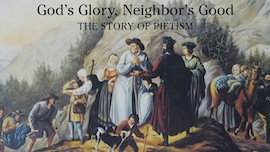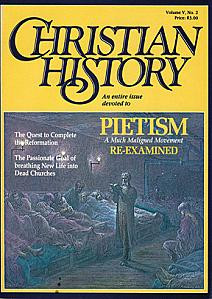A PROMISE Kept Bore Fruit in Arndt's True Christianity
JOHANN ARNDT was born 27 December 1555, and died on this day, 11 May 1621. Had it not been for the intervention of God, Arndt’s death probably would have come years earlier. In 1579 he fell into the Rhine; a Polish nobleman whom he was tutoring grabbed him by the hair and saved him from drowning. Soon afterward Arndt developed a painful illness. As a medical student, he no doubt suspected his condition was incurable, and his doctors held out no hope. Arndt turned to the Lord, vowing that he would devote his life to God’s service if the Lord would heal him. He recovered and was true to his word. He switched from medical studies to theology.
Despite weak health, he became a pastor at Badeborn. A man of principle, he lost that first position because his Duke was a Calvinist and rejected Arndt’s insistence on performing the Lutheran ritual of exorcism at baptism. In a letter dated 10 September 1590, Arndt argued that Christian exorcism at baptism could be traced to at least the third century.
Ousted from Badeborn, he accepted a call to Quedlinburg, where he spent nine strained years because its people disliked him. Eventually he moved to Brunswick, then to Eisleben, and finally to Celle.
While at Eisleben, Arndt published the work that made him famous. This was a four-volume set titled The True Christianity. He longed for a faith that went beyond head knowledge to a real connection to Christ with practical application of the truth. In this he followed the Medieval Christian mystics, especially Tauler, Thomas à Kempis, Saint Bernard, and the anonymous author of Theologica Germanica.
His vision inspired many contemporaries. The True Christianity was a best-seller for decades. Johann Albrecht Bengel, a notable German theologian, actually speculated that Arndt was the angel of Revelation 14:6 who was prophesied to preach the gospel. (In the sixteenth century, Revelation was generally interpreted as prophecies being fulfilled in ongoing history.)
Arndt is considered the forerunner of the movement that came to be called Pietism, in which people sought to bring forth fruits in keeping with their justification. Pietism exerted a strong influence on Scandinavia, South Africa, and the United States. Through Moravians missionaries it touched places as far apart as the Caribbean and Greenland. So profound was Arndt’s influence following his healing that we can hardly doubt God intervened to spare his life for that purpose.
—Dan Graves
----- ----- -----
Learn more about Pietism by watching God's Glory, Neighbor's Good
(God's Glory, Neighbor's Good can be purchased at Vision Video.)
CH 10: Pietism: A Much-Maligned Movement Re-Examined also covers the topic of Pietism








